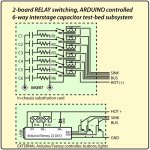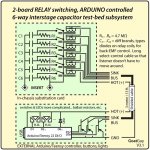Just do it. I've already a quick RCA - rotary switch - RCA wooden panel board. You can connect the capacitors behind the panel, that way you won't see which capacitor is which. You can type down each rotary switch position and if you can hear a difference, listen to long term differences, and write down observations. Give it a few days of playing around, switching positions, then look over and discover which capacitors you liked the most.
Exactly. A make before break rotary switch would never let anything float. The goal being to separate what you imagine you hear from things you can pinpoint and repeat consistently with a fast switch. I know myself listening to the same song an hour apart who could remember what is different? He'll i could convince myself the same cap sounds different tomorrow on the same song!
Since… I've invested a bit of time in drawing up things… here's the 'version 3', which incorporates 3 V miniature relays, and an Arduino / Teensy style stand-alone microcontroller (USB powered).
Beauty is, could also be computer controlled, or at least, the attached tablet/computer could also be observing the results, tallying them for later statistical analysis.
The possibilities are almost endless.
Just Saying,
GoatGuy ✓
Beauty is, could also be computer controlled, or at least, the attached tablet/computer could also be observing the results, tallying them for later statistical analysis.
The possibilities are almost endless.
Just Saying,
GoatGuy ✓
Attachments
When you get eyeglasses the optomitrist flips lenses on your eyes then asks better or worse. When he gets down to the last two lenses both are good but one will be slightly better. If you had to make that final determination an hour later instead of in milliseconds, you couldn't do it. I see the test for audio differences as perceived the same way. Remove the time and memory factor, also remove the room acoustics, except with caps instead of lenses.
When you get eyeglasses the optometrist flips lenses on your eyes then asks better or worse. When he gets down to the last two lenses both are good but one will be slightly better. If you had to make that final determination an hour later instead of in milliseconds, you couldn't do it. I see the test for audio differences as perceived the same way. Remove the time and memory factor, also remove the room acoustics, except with caps instead of lenses.
Yah, all that, but also too
№ 3 - double blind random selection
№ 4 - recording of findings
№ 5 - many-subject (listener) breadth
№ 6 - nefarious-listener 'confirmation bias' thwarting
That last one is a big one: people who have built and burnish a reputation of having Golden Ears, and especially ones that can hear-and-extol-the-virtues of platinum plated ground unicorn horn $1,000-a-pop capacitors, very often (and quite subtly) go far, far out of their way to determine in advance what is being tested, and when parts are substituted in, which they are listening to at the moment.
The above box-and-relay card, which I'm buying parts to build, rather completely undermines the Nefarious Agent Looking for Confirmation Bias Clues.
Which is good.
Makes 'em mad, but who cares.
Just don't rub noses in it, that's all.
Just Saying,
GoatGuy ✓
My go-to guy for logic and process in diy audio is SY. I'm easily impressed, but anyone with a science background who can record music, critique wine and blow up testgear and audio equipment with Morgan Jones has my admiration.
For me, this article sets out the problem and the solutions involved in assessing claims of component preference with such clarity, it is hard to beat.
For me, this article sets out the problem and the solutions involved in assessing claims of component preference with such clarity, it is hard to beat.
I consider some of the less expensive "budget" recommendations here needless expense. Nobody has yet said "those ubiquitous light blue boxy ones", so let me say it. Easy enough to search for on Digikey. I forget the brand name, maybe starts with X or Z.
I am quite happy with Vishay Mylar films 400V orange epoxy dipped.
If I want higher Voltage then I use RS standard wound PP film in 1000V or 1500V rating seem to work fine.
I have some Ero Film capacitors, and they're quite good too (630V rated)
I often get away with boggo Epcos/Kemet PP film box capacitors, cheap, cheerful and good for 400V.
No gold lettering though-a deal breaker for some.
If I want higher Voltage then I use RS standard wound PP film in 1000V or 1500V rating seem to work fine.
I have some Ero Film capacitors, and they're quite good too (630V rated)
I often get away with boggo Epcos/Kemet PP film box capacitors, cheap, cheerful and good for 400V.
No gold lettering though-a deal breaker for some.
I consider some of the less expensive "budget" recommendations here needless expense. Nobody has yet said "those ubiquitous light blue boxy ones", so let me say it. Easy enough to search for on Digikey. I forget the brand name, maybe starts with X or Z.
I quit buying from Digi key years back when they were buying transistor knock offs. I had very bad results from the transistors I purchased from them. After that episode I started buying the semi conductors from Mouser and have not experienced any problems from anything I have purchased from them.
I quit buying from Digi key years back when they were buying transistor knock offs. I had very bad results from the transistors I purchased from them. After that episode I started buying the semi conductors from Mouser and have not experienced any problems from anything I have purchased from them.
Well, I have had the opposite; bad experience with Mouser and now only use Digikey. Irrelevant to the point I was making in any case.
I consider some of the less expensive "budget" recommendations here needless expense. Nobody has yet said "those ubiquitous light blue boxy ones", so let me say it. Easy enough to search for on Digikey. I forget the brand name, maybe starts with X or Z.
You missed it, post #37. They're black and the company starts with P.
You missed it, post #37. They're black and the company starts with P.
ECWFE2J104P
Would have been what I needed. They aren't stocked by Mouser.
Did anybody try capacitors from Walmart? Looks like legit.
https://www.walmart.com/ip/Safety-Capacitor-Polypropylene-Film-0-33uF-275VAC-X2-MKP-10-Pcs/353328560
https://www.walmart.com/ip/Safety-Capacitor-Polypropylene-Film-0-33uF-275VAC-X2-MKP-10-Pcs/353328560
Then you go home, and a couple of days later you realise you picked the wrong ones. Actually using them for a period showed up deficiencies that a quick swap didn't. Poor analogy, particularly as the eye test will show differences even on a quick swap.When you get eyeglasses the optomitrist flips lenses on your eyes then asks better or worse. When he gets down to the last two lenses both are good but one will be slightly better. If you had to make that final determination an hour later instead of in milliseconds, you couldn't do it. I see the test for audio differences as perceived the same way. Remove the time and memory factor, also remove the room acoustics, except with caps instead of lenses.
ECWFE2J104P
Would have been what I needed. They aren't stocked by Mouser.
That doesn't seem to be a completer part number - a character is missing at the end (1/5/8/A/D/L). Would ECWFE2J104J Work? It's in stock and has "standard" long leads.
That doesn't seem to be a completer part number - a character is missing at the end (1/5/8/A/D/L). Would ECWFE2J104J Work? It's in stock and has "standard" long leads.
ECWFE2J104P has a "P" on the end. Just as complete a number as what you posted. What you posted ECWFE2J104J
Mine has a "P" Yours has a "J" Probably different voltage.
- Home
- Amplifiers
- Tubes / Valves
- On the cheap..Best coupling cap

